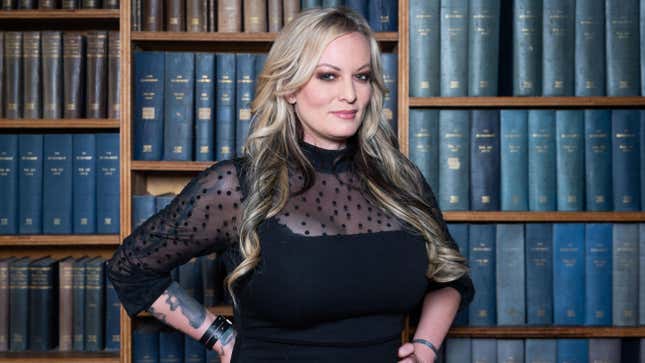Stormy Daniels Says Straights Can Learn a Few Things From For the Love of DILFS
The host of the OutTV dating show spoke to Jezebel about representation, sexual identity, and how she keeps going: "I’m alive out of pure spite and pettiness."


“I’m truly running out of creative ways to piss conservatives off,” Stormy Daniels tells audiences within the first two minutes of the premiere of For the Love of DILFS (a reality dating show for, you guessed it: DILFs, but also the men they’d like to date who happen to be some years their junior). That’s no hyperbole for the show’s host and multi-hyphenate.
Since 2016, Daniels has found herself at the eye of a series of public shitstorms. Between facing down vicious threats from former president Donald Trump over their short-lived affair to a betrayal from her former attorney, Michael Avenatti, who was charged with stealing proceeds from her memoir, Full Disclosure, in 2022 to all the backlash in between, it’s safe to say she’s been through it. But, in all of the fallout, Daniels is having fun.
OutTV’s For The Love Of DILFS, which will be available to stream on January 23, sees Daniels as something of a guru (or, in her words: “seeing-eye pussy”) for ten himbos (young, hot gay men) and daddies (old, hot gay men) in their search for their respective opposites. A callback to the reality dating shows of yesteryear (Think A Shot at Love with Tila Tequila or I Love New York), the series is certainly a campy good time. But the silliness isn’t what got her to host a second season, rather it was the contestants’ candor on the things that have long been treated as too complex—or controversial—for unscripted television. Identity, sexuality, and aging, for example, are all immediately introduced. Even The Golden Bachelor—a charming spinoff that largely avoided its predecessor’s superficiality in its debut—could never.
On Zoom, Daniels spoke to Jezebel about why For the Love of DILFS is must-see television, what straight people can learn from the contestants, and how she keeps going despite the right-wing moral crusaders. This interview has been edited for length and clarity.
This is your second season hosting For The Love Of DILFS. I have to imagine there’s a lot to love about being the only woman in a house of gay men, but what’s been your favorite thing about the gig?
I’ll start with the superficial stuff: How could anybody not have a great time hosting a reality show with all of these scantily clad, hot men? My favorite thing about the show, however, is the platform. I’ll be completely honest, I went in apprehensive. “Is this going to be the television version of clickbait?”; “Is it actually going to be contrived and scripted?”; “Is it going to really exploit some of these sensitive topics that may or may not come up?”; “Is it going to be edited in a dishonest way that’s just salacious?” Those were my concerns. But nothing is scripted. Nothing is contrived.
As someone who thinks of themselves as a reality television savant, there are a lot of discussions one wouldn’t typically see on a dating show—especially not in the first episode. These contestants wasted no time setting boundaries and sharing their trauma with such refreshing frankness. Was that at all surprising to you?
-

-

-

-

-

-

-

-

-

-

-

-

-

-

-

-

-

-

-

-

-

-

-

-

-

-

-

-

-

-

-

-

-

-

-

-

-

-

-

-








































